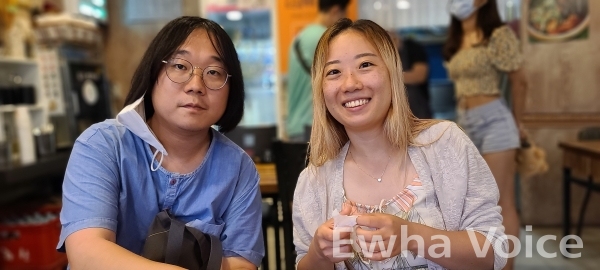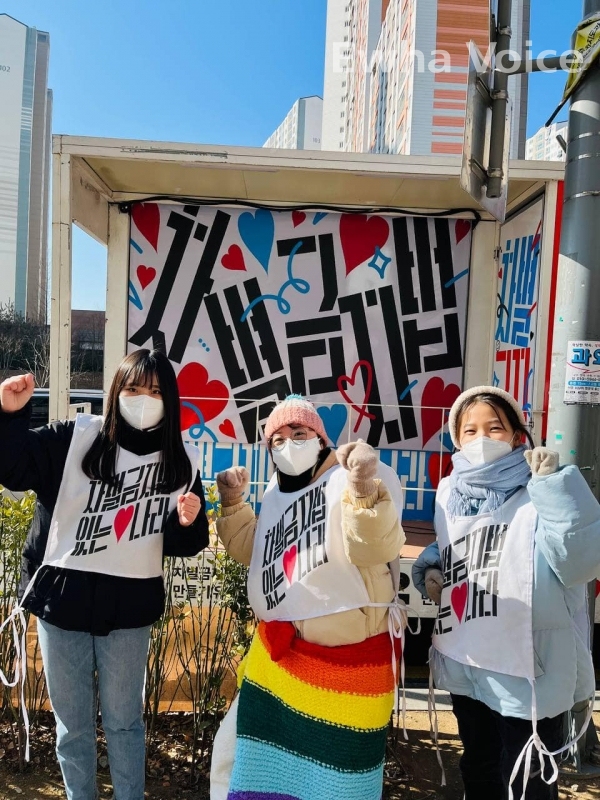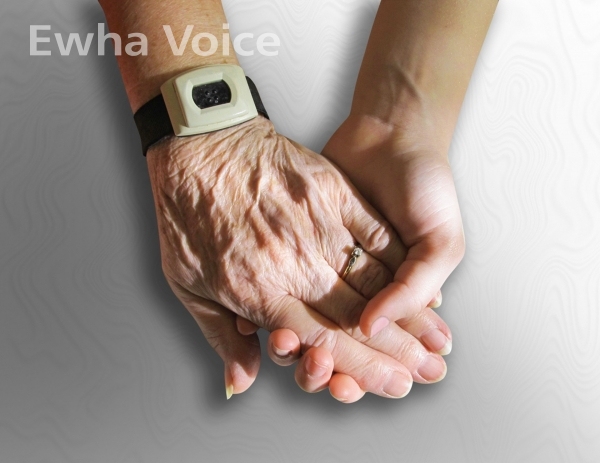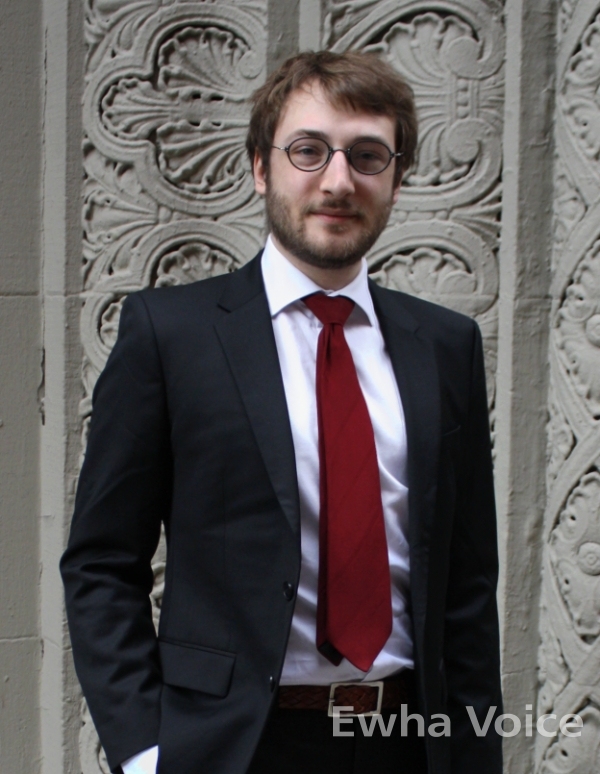In March 2021, the World Health Organization (WHO) published the “Global report on Ageism” to address the severity of ageism and actively combat the phenomenon. According to the WHO, ageism refers to stereotypes, prejudice, and discrimination based on one’s age. In 1969, Robert Neil Butler, the first director of the National Institute on Aging, initially coined the term ageism in reference to discrimination against the elderly. However, the term is now used to refer to discrimination against all age groups, reflecting the current circumstances of how ageism is not an exclusive problem for the elderly. Ewha Voice took a look at ageism not only from the perspective of the older age group, but also from other affected groups.
Scoping ageism in adolescent’s shoes: Youth human right activists discuss ageism in Korea

Living in Korea as an adolescent, one might have heard someone saying, “Behave like a student,” or “If you are a teen, act like one.” Usually, these sayings are used to either mock teenagers’ opinions or coerce teenagers defer to adults. Not surprisingly, teenagers suffer from frequent age-based discrimination and disrespect that take place both consciously and unconsciously. In response, activists have raised concerns about ageism as it could negatively affect teenagers.
Jieum, a youth human rights solidarity group, has focused on the problems derived from ageism since its establishment in 2020. Jieum is comprised of adolescent and adult activists who mainly deal with human rights issues regarding adolescents. Ewha Voice met two members of Jieum to discuss the problems of ageism and ways to resolve them.
Gonghyun, the chief activist of Jieum, has dedicated himself to ageism since 2005. He recognized the necessity of an organization that fights for the rights of the young and decided to take part in the organization when Jieum was first founded in 2020. The organization consists of people of all ages who are interested in actively mitigating the problems faced by teenagers, such as ageism, violence, student rights, and political rights.
“The assumption that all teenagers must be students is the product of ageism,” Gonghyun said. “The premise that students must be obedient as they are immature and uneducated underlies that assumption. Also, not all teenagers are students. There are occasions where being a student does not matter but is merely used to limit a person’s freedom solely because the individual is a student and is easily silenced.”
Gonghyun pointed out that teenagers encounter many cases of ageism in school as well. He experienced cases such as young students being forced to bow to upper-level students. Teachers occasionally talk down to students or speak harshly to them, whereas such students are not allowed to protest against these unfair situations.
Ageism frequently happens via social media and computer games. Min Seo-yeon, a youth activist, reveals that she often watches someone abruptly asking a player’s age while playing a game to identify whether he or she can disdain or mock the other person or not.
“It is common for teenagers to be insulted with sayings such as, ‘You will not grow tall if you don’t sleep early,’ for using the Internet at night,” Min said. “Most notably, hate speech relating to youth and immaturity are pervasive on the Internet.”
Jieum vigorously speaks up for ageism remaining in politics as well. Both Min and Gonghyun found aspects of local governments, legal systems and the recent presidential election discriminatory toward teenagers.
“When I participate in political events hosted by the local government, I soon get the impression that the event is open to youth just for show,” Min stressed. "Most of the time, adults take the lead and make decisions, while we do not have enough opportunity to speak our opinions. Adults justify their deeds by asserting that youth are ignorant of the administrative systems.”

According to Min, most candidates in the recent presidential election presented election pledges only for teenagers in school. There are even candidates who did not make a single pledge regarding teenagers, the implication being that Korean society does not recognize teenagers as citizens.
Additionally, people under 18 were not allowed to take part in election campaigns and were prohibited from expressing support for a particular candidate on the internet. In the Public Official Election Act, there is even a clause that states that the elder candidate be elected when two or more candidates tie for first place.
To overcome such discrimination, Jieum tries to teach adults to recognize the ageism prevailing in our society. Jieum emphasizes that teenagers who have internalized ageist ideas should also learn about the issue and how to deal with it.
Jieum holds a campaign called “Young People Are Not Subordinates” every Children’s Day. During the campaign, the group focuses on three main activities. First, they write about age-discriminatory expressions and language habits commonly used in daily life and explain why such expressions are discriminatory. One example is writing an analysis of discriminatory words such as jammin, a word ridiculing child as a nuisance or an impudent one.
Second, they share stories of teenagers and school teachers working to minimize the use of such expressions. Finally, they propose ways to get along with young people by designing posters and putting them up in classrooms or civil organization centers.
For this year’s campaign, Jieum is preparing a crowdfunding campaign in commemoration of the 100th anniversary of Children’s Day. Specifically, they are designing a tumbler, a badge, and a booklet each sporting their motto, “Young people are not subordinates.”
Looking back at 2005, when Gonghyun first started his career as an activist, he mentioned that the situation has become much better, but there is still room for improvement.
To further mitigate and overcome the issue of agesim, he said that university students could start by raising awareness about the current situation and refraining from using discriminatory expressions. From a broader perspective, he wishes to bring change to the relationship between schools and students. For example, students could participate in the operation of schools and help with decision-making.
A desperate need of mitigation for the most prevalent target, older adults

South Korea is an aged society since 16.5 percent of its total population is 65 years old or more as of 2021. The figure has surged the most among OECD countries over the past decade, in accordance with the increased life expectancy and the current total fertility rate lower than 1.
Nonetheless, the lives of older people have not seen much improvement as Korea still has the highest rate of suicide among older people in the OECD. The relative poverty rate of older people marked 43.3 percent in 2021, also the highest among OECD countries. Ageism is largely responsible for the miserable circumstances of many older people.
To cope with the problems including ageism, Ewha Institute of Age Integration Research (EIAIR) strived to examine the impact of ageism and come up with the blueprints for the “Age Integrated Society.” In an interview with Ewha Voice, the director of EIAIR, Professor Chung Soon-dool explained “Age Integrated Society” as the place where opportunity is not restricted due to a person’s age.
“Unlike other institutions regarding aged society, EIAIR included the word ‘Age Integration’ to openly discuss irrational attitudes that emerge due to age in general,” Professor Chung said. “We mainly focus on problems the older people encounter. However, we did not want to limit our academic interest to specific age groups as the problems of old generations are related to other generations.”
Professor Chung identifies workplaces in South Korea that avoid hiring older people as an obvious example of ageism against older people. She examines many cases in which older people were denied employment due to their age or find it difficult to be reemployed in the job they want only because they are old.
“The employment field is particularly harsh for older women,” Professor Chung stated. “Most older women looking for jobs either experienced a career break or never have been employed before, since men usually acted as the breadwinner. Seeking a job at an old age, they are even more likely to face a wall. Wage inequality is also more severe for women of old age.”
Even though one finds a job, most working environments are not age-friendly. Older workers need sufficient break time in between their working hours and places to take breaks as well. These are not easily seen in the typical workplace in Korea. Facilities are also designed for the convenience of young people, which hinders older employees from working efficiently. Such workplace issues are the results of ageism.
Besides ageism in the workplaces, hate speech that taunts old people and builds damaging stereotypes is prevalent in Korean society and reinforces ageism. Professor Chung stressed that the main users of such age-discriminatory expressions are members of younger generations, but the older people readily internalize them as such expressions are common in our society.
“Older people may start to believe they are useless if they keep hearing such expressions like yeongeumchung, which scorns older people as only interested in receiving pension and being useless,” Chung said. “They tend to experience depression after internalizing those phrases. The negative stereotypes that younger people have about the old generation were remarkably reinforced as they kept using hate speech. Younger generations were also less reluctant to commit behavioral ageism as well.”
EIAIR’s focus today is on the relationship between older adults and younger adults in workplaces. As the two groups tend to cooperate and interact in workplaces, their main question rests on whether the relationship affects the productivity or not. To publish meaningful research, they have conducted surveys, meeting and speaking with older adults and younger adults who working together.
Professor Chung also elaborated on age-discriminatory examples used towards women. Older women tend to be economically poorer compared to their counterparts, with about two-third of poor older adults being female. As these women have a hard time leading an independent life, the public may think they must rely on the public to provide for them. This phenomenon leads to the use of discriminatory words such as halmaemi.
To solve the problem and strive for a better future, Professor Chung advises students to try to understand the older generation. As the younger generation and older generation coexist in the same society, it would be best to cooperate to make a better world together.
“Young adults tend to listen to the words of older adults in today’s society, but they need to try to understand them and the background of the values and thoughts of the older generation,” Chung said.
Millennials and Gen Z, another victim of ageism: Stephane Francioli’s analysis on the status-quo

While many may assume that Millennials, those born between the 1980s and 2000s, and Generation Z (Gen Z), born between the mid-1990s and late 2010s, are far from being the target of ageism, some experts assert that the situation is worse than could be imagined. Stephane Francioli, a senior doctoral candidate in Management & Organizations at Leonard N. Stern School of Business at New York University, explains his view on why ageism occurs and affects unexpected targets.
Francioli started by elaborating on his on-going work with Professor Felix Danbold and Professor Michael North, “Millennials versus Boomers: Asymmetric Patterns of Realistic and Symbolic Threats Drive Intergenerational Tensions.” The work suggests that tensions and conflicts prevail between older adults and younger generations. Whereas older adults are seen by younger generation as a threat to their economic means, younger generations are viewed by older adults as a threat to the deep-rooted culture and values of society.
To be specific, older adults are viewed to threaten the younger generation’s economic status in various ways. Francioli explains that part of the reason for today’s social problem where young generations struggle to buying their own houses actually comes from the wealth of today’s older generations. Moreover, older generations tend to be healthier than before due to the development of technology, leading them to remain longer in influential economic and political positions. This actually discourages young generations as they experience constraints on their ability to form and lead society’s future.
From the opposite perspective, younger generations are seen to threaten deep-rooted core values that older generations strongly believe in. Older generations nowadays assess young generations as radically progressive, disrespectful, or from an extreme view, even destructive of society and leading to a moral and social decline.
Francioli asserts that generation labels such as Millennials and Gen Z make the aforementioned situation worse as the labels that may be popularly used in media, are actually artificial and are not valued in academia. Since generation labels exist as social constructs, people tend to caricature younger and older adults. Such caricatures make it difficult to recognize the values that exist within each generation, only aiming attention at the differences, which ultimately leads to increased tension between the two groups.
With this in mind, drawing attention to the artificiality of generation labels could be a way to mitigate the problem of the tension and conflict occurring between the two groups.
Back to the assumption that many think that young adults are far from being the targets of ageism, Francioli and Professor North responded that young generations are actually subject to a great deal of many prejudicial attitudes. The fact that Americans have the most negative opinion of the young, compared to the middle-aged or older adults frankly shows the seriousness.
One thing to keep in mind is that the harsh views towards the younger generations are not in general view of young people, for example including older people’s own days of being young, but are specific to today’s younger generation. Of course, this is not a passing problem; it has in fact prevailed throughout history.
“Younger generations have always been depicted as ‘inferior,’ ‘in danger,’ and ‘morally corrupted’ by their predecessors,” Francioli said. “In the U.S. today, Baby Boomers claim that Gen Z and Millennials are lazy, disrespectful, and radically progressive. But let us not forget that today’s Boomer’s are the young of the 60s, who, at the time, were caricatured as lazy hippies who prefer to smoke weed and sleep in the back of a van rather than find a job, and naively fight Vietnam War with ‘Peace & Love’ slogan because they have been manipulated by communist ideologies. It’s an eternal circle.”
Younger generations are a minority in today’s society and are going through both economic and political hardships, which verifies that the problem is more serious than ever. To mitigate such problems, Francioli suggests that society should acknowledge today’s issues and address them rather than blaming the young generation for their struggle.
Francioli thinks that university students could also help resolve the current problem. He advises that educating people is the key to changing collective consciousness, and therefore, students should get informed and then inform others.
“When you hear ‘young today, they are lazy and disrespectful,’ take the time to correct them: ‘older adults have always said that of previous generations,’” he said. “Point out that generational labels like Millennials and Baby Boomers are artificial, have no scientific validity, and only contribute to reinforce an ‘us-versus-them’ mentality. And then finally, stress why propagating these kinds of stereotypes is dangerous.”

